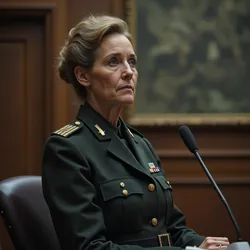The Barnes Tribunal (2039-2041)
 General Anastasia "Stacy" Barnes faces the International Criminal Court during her war crimes trial, February 2040
General Anastasia "Stacy" Barnes faces the International Criminal Court during her war crimes trial, February 2040The Barnes Tribunal was a landmark series of war crimes proceedings held at the International Criminal Court (ICC) in The Hague from 2039 to 2041. The trial centered on General Anastasia "Stacy" Barnes, former commander of the Eastern Strategic Command during the Second American Civil War, and her role in the devastating Philadelphia Incident of October 2038. The proceedings marked the first time a high-ranking American military officer faced international prosecution for crimes against humanity and established crucial precedents for military accountability in the use of autonomous weapons systems.
Background and Jurisdiction
Unlike most military leaders from the Second Civil War who faced the domestic Charleston Tribunals, Barnes's case was referred to the ICC due to the extraordinary nature and international implications of her actions. The decision to prosecute Barnes in The Hague came after intense diplomatic negotiations between the newly reformed United States government under President Elle Fanning and the international community. The presence of Chinese peacekeeping forces during the Philadelphia Incident and the global impact of Barnes's use of autonomous weapons systems provided the jurisdictional basis for ICC involvement.
The prosecution team, led by Chief Prosecutor Maria Bensouda, spent six months gathering evidence and testimony from survivors, military personnel, and international observers. The investigation revealed a pattern of systematic violations of international humanitarian law extending beyond the Philadelphia Incident, including Barnes's actions during the FCG Suppression Campaign and her involvement with the experimental weapons programs of the Federal Continuity Government.
Trial Proceedings
The trial began on January 15, 2040, with Barnes facing 23 counts of crimes against humanity, war crimes, and violations of the laws of armed conflict. The proceedings were marked by unprecedented security measures, as multiple factions from the former Liberty States Alliance had made threats against the tribunal. The court heard testimony from over 300 witnesses, including survivors of the Philadelphia Incident, military experts, and former members of Barnes's command structure.
 Digital reconstruction of Philadelphia's autonomous defense grid presented as evidence during the trial
Digital reconstruction of Philadelphia's autonomous defense grid presented as evidence during the trialA crucial aspect of the prosecution's case focused on Barnes's deliberate manipulation of the autonomous combat systems' targeting parameters. Technical experts testified that she had personally ordered the removal of civilian safety protocols, effectively turning defensive systems into indiscriminate killing machines. The prosecution also presented evidence of Barnes's direct involvement in the deployment of Chemical Deterrent Agent-7 in Philadelphia's subway system, proving she had been aware of the likely civilian casualties.
Barnes's defense team, led by prominent international lawyer Geoffrey Robertson, attempted to justify her actions as necessary military measures taken under extreme circumstances. They argued that the Philadelphia defensive operations were designed to prevent a larger bloodbath that would have resulted from urban warfare between opposing forces. This argument was systematically dismantled by prosecution experts who demonstrated that alternative defensive strategies were available and that Barnes had rejected less lethal options.
Legal Precedents
The Barnes Tribunal established several important legal precedents regarding military command responsibility in the age of autonomous weapons. The court's ruling that commanders bear full responsibility for the actions of automated systems under their control became known as the "Barnes Principle" and was later incorporated into the Global Nuclear Security Protocol and other international agreements.
The tribunal also set standards for the application of international humanitarian law to civil conflicts involving multiple non-state actors. The court's decision that the laws of war apply equally to all combatants, regardless of their political legitimacy or territorial control, influenced subsequent international legislation and military doctrine.
Verdict and Sentence
On March 12, 2041, after fourteen months of proceedings, the ICC found Barnes guilty on 19 of the 23 counts. The verdict was particularly significant for its detailed analysis of command responsibility in the context of autonomous weapons systems. The court rejected Barnes's argument that AI decision-making reduced commander culpability, instead ruling that the use of such systems demanded even higher standards of human oversight and ethical consideration.
Barnes was sentenced to life imprisonment without possibility of parole, the maximum penalty available under ICC statutes. The sentence was to be served at the United Nations Detention Unit in The Hague, making her the highest-ranking American military officer ever to be incarcerated by an international tribunal.
Impact and Legacy
The Barnes Tribunal had far-reaching implications for international justice and military conduct. The proceedings led directly to the creation of the Autonomous Weapons Control Commission, an international body tasked with monitoring and regulating military AI systems. The trial also influenced the development of the National Reconciliation Program, particularly in its approach to accountability for military leadership.
The tribunal's emphasis on command responsibility and ethical deployment of autonomous weapons systems became a cornerstone of military education worldwide. The case studies from the Barnes Tribunal are now required reading at military academies across the globe, serving as a stark reminder of the moral obligations of military leadership.
See also
- War Crimes During the Second American Civil War
- International Criminal Court Cases Related to the Second American Civil War
- Post-War Military Reforms
- Autonomous Weapons Control Treaty of 2043
References
- ICC Official Records: The Prosecutor v. Anastasia Barnes (2039-2041)
- Global Commission on Post-War Justice Annual Report (2042)
- International Humanitarian Law Review: Special Edition on the Barnes Tribunal (2043)